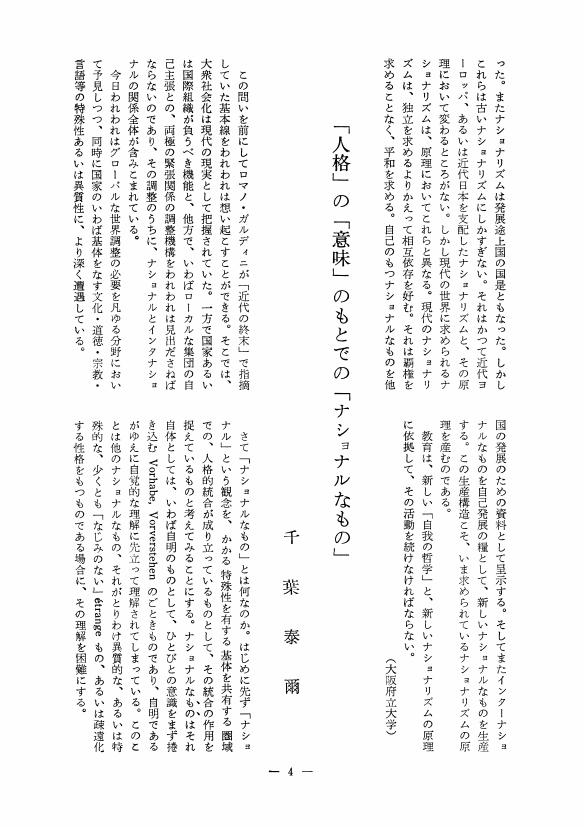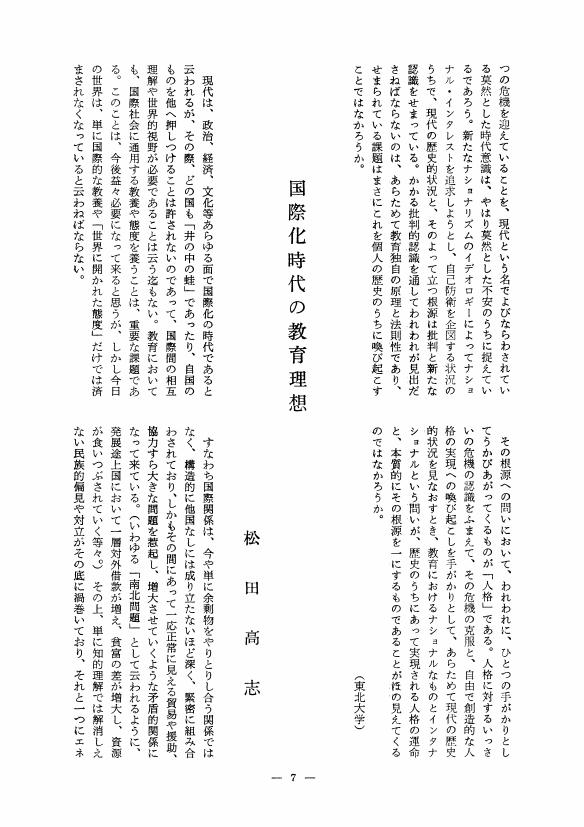1 0 0 0 OA フランス教育哲学研究の一軌跡
- 著者
- 石堂 常世
- 出版者
- 教育哲学会
- 雑誌
- 教育哲学研究 (ISSN:03873153)
- 巻号頁・発行日
- vol.1982, no.46, pp.56-61, 1982-11-15 (Released:2009-09-04)
- 参考文献数
- 4
1 0 0 0 OA アメリカの教育学研究の一側面 教育の哲学的研究動向を中心に
- 著者
- 市村 尚久
- 出版者
- 教育哲学会
- 雑誌
- 教育哲学研究 (ISSN:03873153)
- 巻号頁・発行日
- vol.1982, no.46, pp.62-68, 1982-11-15 (Released:2009-09-04)
1 0 0 0 OA チューリッヒ大学教育学研究所のこと
- 著者
- 下山田 裕彦
- 出版者
- 教育哲学会
- 雑誌
- 教育哲学研究 (ISSN:03873153)
- 巻号頁・発行日
- vol.1982, no.46, pp.69-73, 1982-11-15 (Released:2009-09-04)
1 0 0 0 OA 上野浩道著『芸術教育運動の研究』
- 著者
- 久木 幸男
- 出版者
- 教育哲学会
- 雑誌
- 教育哲学研究 (ISSN:03873153)
- 巻号頁・発行日
- vol.1982, no.46, pp.74-79, 1982-11-15 (Released:2009-09-04)
1 0 0 0 OA 杉浦 宏編『アメリカ教育哲学の展望』
- 著者
- 俵木 浩太郎
- 出版者
- 教育哲学会
- 雑誌
- 教育哲学研究 (ISSN:03873153)
- 巻号頁・発行日
- vol.1982, no.46, pp.80-85, 1982-11-15 (Released:2009-09-04)
1 0 0 0 OA 「校内暴力」事件からみた学校の存在意義
- 著者
- 小川 博久
- 出版者
- 教育哲学会
- 雑誌
- 教育哲学研究 (ISSN:03873153)
- 巻号頁・発行日
- vol.1982, no.45, pp.27-29, 1982-05-15 (Released:2009-09-04)
1 0 0 0 OA 研究討議に関する総括的報告
- 著者
- 村田 昇
- 出版者
- 教育哲学会
- 雑誌
- 教育哲学研究 (ISSN:03873153)
- 巻号頁・発行日
- vol.1982, no.45, pp.30-33, 1982-05-15 (Released:2009-09-04)
1 0 0 0 OA ペスタロッチーの初期思想における「困窮」の人間形成的意義
- 著者
- 木村 吉彦
- 出版者
- 教育哲学会
- 雑誌
- 教育哲学研究 (ISSN:03873153)
- 巻号頁・発行日
- vol.1982, no.45, pp.34-46, 1982-05-15 (Released:2010-01-22)
- 参考文献数
- 66
In this paper the role of “Need” (Not) in the formation of man in its material and spiritual meaning shall be examined as it is found in the early stages of Pestalozzi's. thought.Material need produces the necessary stamina needed by man to become self-reliant through the fulfilment of one's vocational obligations.Thus, “need” by giving. “the opportunity to overcome much”, is a valuable educational means to implant the power of self-restraint which is the basis- for man to develop an autonomous personality.At the basis of Pestalozzi's thinking, was an exclusive reliance on external factors for man in his living; in regard to morality this meant the stress-was on “heterogenous” factors. But the investigation on “need” in this paper makes it clear that also in the early period of the development of Pestalozzi's thinking, he maintained already a, view of man as moral being based on “autonomy.”
- 著者
- 高橋 勝
- 出版者
- 教育哲学会
- 雑誌
- 教育哲学研究 (ISSN:03873153)
- 巻号頁・発行日
- vol.1982, no.45, pp.47-59, 1982-05-15 (Released:2009-09-04)
- 参考文献数
- 43
Up to the present, the evaluation of Kerschensteiner's. Arbeitssehule was divided into two opposing views, either fully supporting, that idea (e.g. Spran-ger) or totally rejecting it (Hohendorf); almost no dialague was carried. on between those two positions. In this paper I try to prove that Kerschensteiner's view on Arbeit includes the following rather differing, elements and that in different periods of his life there was a shift from stressing, this rather than the other element (i. e. his view on Arbeit as such changed).First, in his earlier works (Die Schule der Zukunft eine Arbeitsschule, 1908) Arbeit means an importhant method for setting, free the subjeotive “sel-acitivity” (Selbsttätigkeit) of the child, furthering the autonomy of both“living”(Leben) and “learning”(Lernen) (Arbeit as a methodological principle of self-activity).But in the 6, th edition of the Begriff der Arbeitsschule this position is evidently revised shifting toward the postulates of civic morality. Secondly, that is, emphasis is put on the principle of Sachlichkeit, i.e. (1) on the development of the power to work and (2) on its nature as a useful instrument for forming the character trait (Will) of readiness to serve. It is probably here that the “Idea of disciplined work” in the sense of moral education arose.By way of conclusion I maintain that Kerschensteiner's theory of the Arbeitsschule is not to be treated in terms of an alternative as in the past, either accepting it unconditionally or rejecting it in toto, but that it is to be reconsidered and reevaluated anew after grasping accurately. the two different aspects of Arbeit.
1 0 0 0 OA 「道徳性」の現象学的解明の試み 教育の人間学的視点から
- 著者
- 山下 泰子
- 出版者
- 教育哲学会
- 雑誌
- 教育哲学研究 (ISSN:03873153)
- 巻号頁・発行日
- vol.1982, no.45, pp.59-71, 1982-05-15 (Released:2009-09-04)
- 参考文献数
- 29
I. The purpose of this study is to interpret the structure of the development of morality in children from anthropological viewpoint of education.II. For this purpose Heidegger's “Historical Existence” seems quite helpful as a basis of interpretation. Re-examining the pedagogical meaning of his concept of existence we are able to arrive at a hypothesis on the interpretation of morality from an anthropological viewpoint of education.III. To examine validity of the interpratetion, I would like to touch upon. Kant's metaphysical foundation of morality. Then I proceed to examine the relationship between Kant's morality and the interpretation of Heidegger's “practical reason”.IV. Finally, I would like to examine critically Heidegger's “analytics of existence” from an anthropological viewpoint of education. In addition, I shall describe various forms of morality of the educand and their structure at different stages.
1 0 0 0 OA 明治期啓蒙の課題 津田真道を中心に
- 著者
- 金子 幸子
- 出版者
- 教育哲学会
- 雑誌
- 教育哲学研究 (ISSN:03873153)
- 巻号頁・発行日
- vol.1982, no.45, pp.71-83, 1982-05-15 (Released:2009-09-04)
- 参考文献数
- 49
Masamichi Tsuda (1829-1903) known widely as a jurist wrote for the Meiroku Zasshi, an important progressive journal of the Meiji period. Contributors to this journal were interested in the education that people needed in order to build the new nation. In order to develop the wealth and power of Japan, Tsuda suggested building new schools emphasizing the study of jitsugaku. Advocating a new spirit of independence and freedom, he anticipated the appearance of a new generation of internationally minded individuals. By using Western ideas he re-interpreted Tokugawa period thinking of Chu Hs's ideas. This essay will examine Tsuda's new concept of nature, man, and society and outline his concepte of jitsugaku and freedom.
1 0 0 0 OA リットのナチズム批判
- 著者
- 新井 保幸
- 出版者
- 教育哲学会
- 雑誌
- 教育哲学研究 (ISSN:03873153)
- 巻号頁・発行日
- vol.1982, no.46, pp.1-16, 1982-11-15 (Released:2010-01-22)
- 参考文献数
- 27
On the basis of two of Litt's papers in which in the early 1930 ies he criticised Nazism, I have summarized his criticism in two point's. Litt's argument in “University and Politics” (“Universität und Politik”) can be summed up as follows : 1. Political interference with science tends to destroy it because it infringes on the autonomy of science.2. A university should be firmly grounded in its function as a research institution ; by doing so it can best serve the state. In addition, I interpret the term “hohe Schule des Geistes” as an expression symbolic of the above-mentioned outlook on the university.Next, I discuss the significance of the paper “The Position of the Mental Sciences in the National Socialist State” (“Die Stellung der Geisteswissenschaften im national-sozialistischen Staate”) from the viewpoint of criticism against Nazism.1. Investigating the problem from many different angles it demonstrates that it is wrong for science to serve Nazism.2. It proves that the attempt of ethnology to explain history by means of the concept of race is fundamentally impossible.3. It divides the way Nazis deal with history into three different kinds and points out that each of them contains internal contradictions as well as contradictions with each other.By way of conclusion, I maintain that Litt's peculiar method of criticism pointing at the logical weakness of Nazism amounts to an indirect verdict of Nazism as such.
1 0 0 0 OA 教育における当為一元論の終焉 ペスタロッチとフィヒテの場合
- 著者
- 土戸 敏彦
- 出版者
- 教育哲学会
- 雑誌
- 教育哲学研究 (ISSN:03873153)
- 巻号頁・発行日
- vol.1982, no.46, pp.17-32, 1982-11-15 (Released:2009-09-04)
- 参考文献数
- 45
In the pedagogy of Pestalozzi and Fichte there is a fundamental difference as the former entertained a nostalgia toward the past whereas the latter was filled with a desire toward the future; however, there is agreement among them as they both postulate education as an urgent matter. Because of this urgency in the traditional meaning of educational theory as oughtness has been exhibited in a typical form by both thinkers.If, however, educational theory in general is expressed in the form of setting up a particular situation, the setting up of the traditional educational theory issuing exclusively from oughtness, this theory assumes a certain air of unreal imagination. Both, Pestalozzi's “education of the paret mind” and Fichte's “state isoleted education” signify, from the viewpoint of educational history, the last product of setting up such an imaginary situation, In the time after Pestalozzi and Fichte education became a matter of urgency and educational theory centered on oughtness was no longer allpowerful, and the setting up of an imaginary situation lost its validity. Thus, during the 19th century, educational reflection originated, i. e. the question was raised “what is education.”
1 0 0 0 OA ブラメルド教育哲学の研究
- 著者
- 甲斐 進一
- 出版者
- 教育哲学会
- 雑誌
- 教育哲学研究 (ISSN:03873153)
- 巻号頁・発行日
- vol.1982, no.46, pp.33-37, 1982-11-15 (Released:2009-09-04)
- 参考文献数
- 8
- 著者
- 竹内 巧
- 出版者
- 教育哲学会
- 雑誌
- 教育哲学研究 (ISSN:03873153)
- 巻号頁・発行日
- vol.1982, no.45, pp.1-4, 1982-05-15 (Released:2009-09-04)
1 0 0 0 OA 「人格」の「意味」のもとでの「ナショナルなもの」
- 著者
- 千葉 泰爾
- 出版者
- 教育哲学会
- 雑誌
- 教育哲学研究 (ISSN:03873153)
- 巻号頁・発行日
- vol.1982, no.45, pp.4-7, 1982-05-15 (Released:2010-01-22)
1 0 0 0 OA 国際化時代の教育理想
- 著者
- 松田 高志
- 出版者
- 教育哲学会
- 雑誌
- 教育哲学研究 (ISSN:03873153)
- 巻号頁・発行日
- vol.1982, no.45, pp.7-10, 1982-05-15 (Released:2009-09-04)
- 参考文献数
- 2
1 0 0 0 OA 教育の国際的な出会い あわせて、「文化際」的な観点について
- 著者
- 石附 実
- 出版者
- 教育哲学会
- 雑誌
- 教育哲学研究 (ISSN:03873153)
- 巻号頁・発行日
- vol.1982, no.45, pp.10-13, 1982-05-15 (Released:2009-09-04)
- 著者
- 東 日出男 森田 孝
- 出版者
- 教育哲学会
- 雑誌
- 教育哲学研究 (ISSN:03873153)
- 巻号頁・発行日
- vol.1982, no.45, pp.13-16, 1982-05-15 (Released:2009-09-04)
1 0 0 0 OA 教育と暴力 特に校内暴力を中心として
- 著者
- 山口 治
- 出版者
- 教育哲学会
- 雑誌
- 教育哲学研究 (ISSN:03873153)
- 巻号頁・発行日
- vol.1982, no.45, pp.17-20, 1982-05-15 (Released:2009-09-04)













